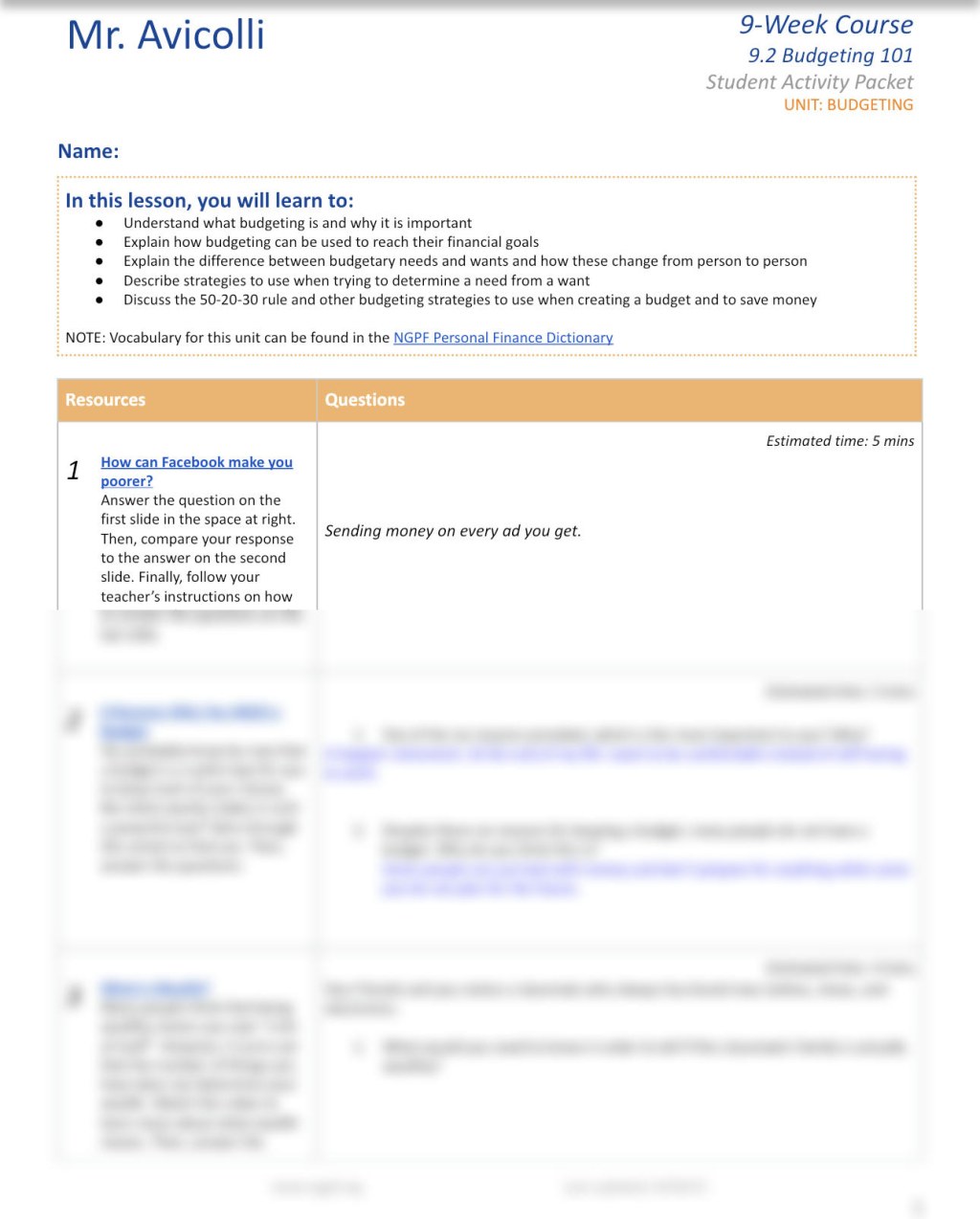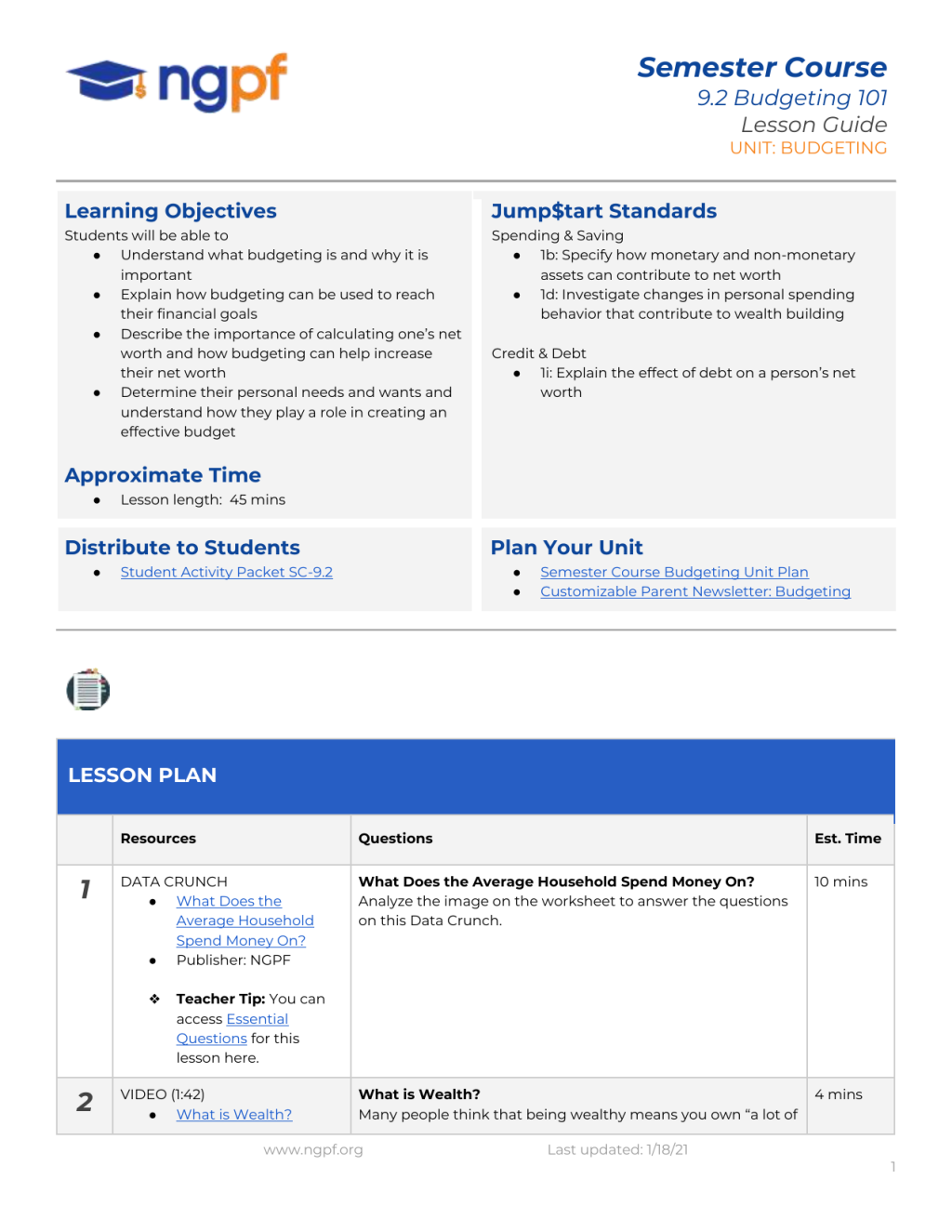9.2 Budgeting 101 Answers
Introduction
Dear Readers,
Welcome to our comprehensive guide on budgeting 101 answers. In this article, we will delve into the key aspects of budgeting, providing you with valuable insights and strategies to effectively manage your finances. Budgeting is a fundamental skill that everyone should possess, regardless of their income level or financial goals. By understanding and implementing proper budgeting techniques, you can take control of your financial future and achieve greater financial stability.

Image Source: amazonaws.com
Table of Contents
What is budgeting?
Who can benefit from budgeting?
When should you start budgeting?
Where should you allocate your budget?
Why is budgeting important?
How to create a budget?
Advantages and disadvantages of budgeting
FAQs about budgeting
Conclusion
Final Remarks
What is budgeting?
Budgeting is the process of creating a plan to manage your income and expenses. It involves tracking and controlling your financial resources to ensure that you can meet your financial goals. A budget serves as a roadmap for your financial journey, allowing you to allocate your money wisely and prioritize your spending.
Who can benefit from budgeting?

Image Source: studylib.net
Anyone, regardless of their financial situation, can benefit from budgeting. Whether you are a student, a young professional, a business owner, or someone nearing retirement, budgeting can help you make informed financial decisions and improve your financial well-being. It is a valuable tool for individuals and families alike, enabling you to live within your means and save for the future.
When should you start budgeting?
The best time to start budgeting is now. It is never too early or too late to take control of your finances. By starting early, you can develop good financial habits that will benefit you throughout your life. However, even if you have never budgeted before, it is never too late to start. The sooner you begin, the sooner you can start making positive changes to your financial situation.
Where should you allocate your budget?
When creating a budget, it is essential to allocate your income to various categories based on your needs and priorities. These categories typically include housing, transportation, food, utilities, debt payments, savings, and discretionary expenses. Allocating your budget effectively ensures that you are meeting your essential needs while also saving for the future and enjoying some discretionary spending.
Why is budgeting important?
Budgeting is important for several reasons. Firstly, it helps you gain a clear understanding of your financial situation. By tracking your income and expenses, you can identify areas where you may be overspending or where you can cut back. Additionally, budgeting allows you to set and achieve financial goals. Whether your goal is to pay off debt, save for a down payment on a house, or plan for retirement, budgeting provides the structure and discipline needed to achieve these goals.
How to create a budget?
Creating a budget involves several steps:
Determine your income: Calculate your total monthly income from all sources.
Track your expenses: Monitor your spending for a month to understand where your money is going.
Categorize your expenses: Divide your expenses into categories such as housing, transportation, groceries, etc.
Set financial goals: Determine what you want to achieve financially, such as saving a certain amount or paying off debt.
Create a budget: Allocate your income to different expense categories, ensuring that your expenses do not exceed your income.
Monitor and adjust: Regularly review your budget and make adjustments as needed.
Save and invest: Allocate a portion of your income towards savings and investments to build wealth over time.
Advantages and Disadvantages of Budgeting
Advantages:
Helps you achieve financial goals and save for the future.
Provides a clear overview of your income and expenses.
Allows you to make informed financial decisions.
Helps you prioritize spending and reduce unnecessary expenses.
Provides a sense of control and reduces financial stress.
Disadvantages:
Requires time and effort to create and maintain a budget.
May require discipline and restraint to stick to the budget.
Unexpected expenses or financial emergencies can disrupt the budget.
May need adjustments as circumstances change.
Can be challenging to balance multiple financial goals.
FAQs about Budgeting
1. Should I include savings in my budget?
Yes, it is crucial to allocate a portion of your income towards savings in your budget. Saving allows you to build an emergency fund, save for future expenses, and work towards long-term financial goals.
2. How often should I review my budget?
It is recommended to review your budget on a monthly basis. This allows you to track your progress, make any necessary adjustments, and ensure that you are staying on track towards your financial goals.
3. Can budgeting help me pay off debt?
Yes, budgeting can be an effective tool for paying off debt. By allocating a specific amount towards debt payments in your budget, you can prioritize debt repayment and accelerate the process of becoming debt-free.
4. Is it possible to budget with irregular income?
Yes, budgeting is possible with irregular income. It may require more flexibility and planning, but by tracking your income and expenses and adjusting your budget accordingly, you can effectively manage your finances even with irregular earnings.
5. Can budgeting help me achieve financial freedom?
Absolutely! Budgeting is a key component of achieving financial freedom. By managing your money wisely, reducing debt, and saving for the future, you can gain control over your finances and work towards financial independence.
Conclusion
In conclusion, budgeting is an essential skill for everyone striving for financial stability and success. By understanding the principles of budgeting and implementing effective strategies, you can take control of your financial situation and work towards achieving your financial goals. Start budgeting today and pave the way for a brighter financial future!
Final Remarks
Dear Friends,
Take the first step towards financial empowerment by implementing the budgeting techniques discussed in this article. Remember, budgeting is a lifelong skill that requires patience, discipline, and adaptability. Stay committed to your financial goals, regularly review and adjust your budget, and seek professional advice if needed. With persistence and determination, you can achieve financial freedom and secure a brighter future for yourself and your loved ones.